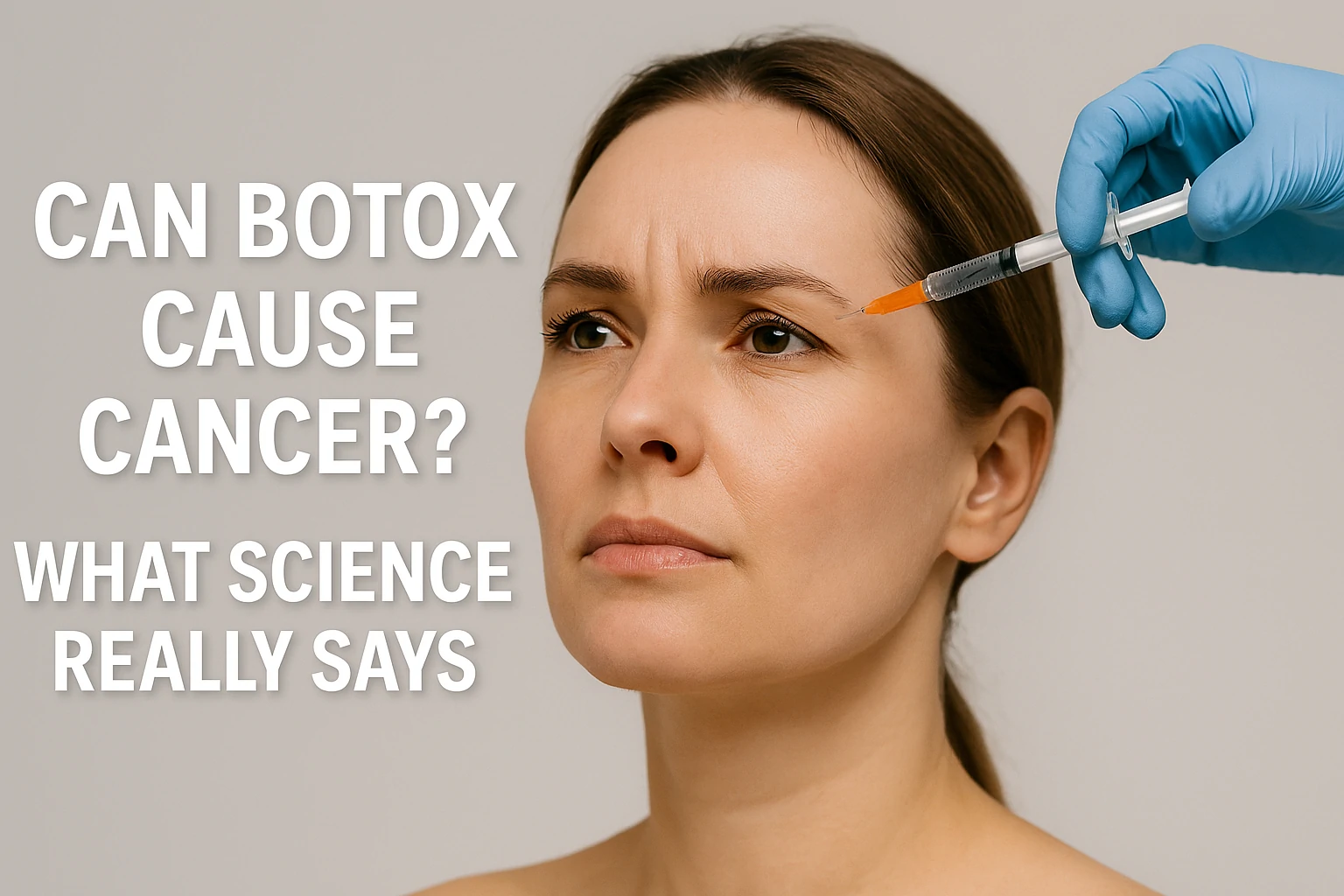Botox is known around the world as a wrinkle-fighting treatment. Many people use it to reduce fine lines and look younger. It has become a common part of beauty routines. Clinics offer it everywhere. Some even use it to treat migraines, muscle spasms, or excessive sweating. Still, many people ask a serious question: Can Botox cause cancer?
This question often comes from fear. People hear the word “toxin” and think it must be dangerous. Some websites spread myths without proof. Others mix facts with fiction. These stories create doubt. A simple search online brings mixed results. Some say Botox is safe. Others claim it might be risky.
This guide clears the confusion. It explains what Botox is, how it works, and what real science says about cancer risk. It uses easy words and clear steps. It helps readers make smart choices. It does not promise magic. It does not ignore risk. It gives honest facts to support safe decisions.
Understanding the truth about Botox matters. People should know what they put into their bodies. This article aims to help you see the full picture. That way, you can choose with care, not fear.
What Is Botox?
Botox is a drug made from a substance called botulinum toxin. This toxin comes from a kind of bacteria. It can cause serious illness in large amounts. But doctors use a tiny, safe dose in Botox treatments. That small dose can block nerve signals in muscles. It makes the muscle relax. This smooths out wrinkles or eases tight body areas.
Botox does not travel far in the body. It stays near the spot where it was injected. It breaks down over time. The effect usually lasts three to six months. After that, many people return for another dose.
The U.S. Food and Drug Administration (FDA) approved Botox years ago. It approved it for both beauty and medical use. Millions of people get Botox each year. Some use it for face lines. Others use it to treat headaches, stiff limbs, or eye problems.
Doctors and scientists have studied Botox for many years. Most agree that it is safe when used the right way. Problems happen most often when people get it from the wrong person or in the wrong dose.
SkinPres T User Guide: Benefits, Side Effects, and How to Use It Right
Why People Worry About Cancer Risk
Some people fear Botox because it comes from a toxin. The word “toxin” sounds bad. It makes people think of poison or disease. But in medicine, many drugs come from dangerous sources. The key is using them in safe amounts.
Online rumors also feed the fear. Some websites claim that Botox leads to cancer. They give no strong proof. Others talk about animal studies that show strange results. These studies do not prove harm to humans. Still, they make people uneasy.
People also worry about long-term effects. They wonder what happens after many years of Botox use. Some think that small doses may build up. Others fear that changes in nerve signals could cause harm over time. These ideas often come from guesswork, not data.
The concern grows when people use Botox in areas close to nerves or the brain. Some ask if it might spread inside the body. Some worry about new uses that inject higher doses. These fears seem real but need to be tested with strong science.
What Does Science Say About Botox and Cancer?
So far, no strong study proves that Botox causes cancer. Many scientists have looked for a link. They studied people who used Botox for years. They compared them with people who did not. They found no rise in cancer risk.
Botox does not change a person’s DNA. It does not make cells grow out of control. That is how cancer starts. Botox only blocks signals between nerves and muscles. It does not enter the bloodstream in large amounts.
A few lab studies raised questions. These studies used cells in dishes or animals in tests. Some showed strange cell growth. But these tests used large doses or special conditions. They do not match how Botox works in humans.
Doctors also report very few serious side effects. Most problems come from bad injection skills, not the drug itself. Swelling, drooping eyelids, or pain may happen. But cancer does not appear on the list of risks from real patient cases.
Health groups, including the FDA, still allow Botox use. They review safety often. If cancer risk showed up, they would take action. So far, they have not.
Understanding How Botox Works in the Body
Botox works in a simple way. It blocks a chemical that nerves use to make muscles move. Without that chemical, the muscle stays still. That stops wrinkles or eases tight muscles.
The body breaks down Botox over time. It does not stay forever. The drug fades after a few months. The treated muscles go back to normal. This cycle repeats with each session.
The dose in a Botox shot is very small. It targets one area, like the forehead or jaw. It does not affect the whole body. It also does not spread through the blood or brain in large amounts.
Botox does not touch the parts of the cell that cause cancer. It does not damage DNA or control how cells divide. It does not work like tobacco, sun rays, or other known cancer risks.
Doctors inject it with care. They use fine needles and watch for side effects. If given the right way, Botox stays where it should. That keeps it safe.
What Experts and Health Agencies Say
Major health bodies have reviewed Botox safety. The FDA allows it for many uses. They tested it in trials before approval. They still track reports of harm from patients and doctors.
The American Cancer Society does not list Botox as a cancer risk. They focus on things like smoking, radiation, and certain chemicals. Botox does not fall in those groups.
Medical journals also review Botox research. Most reports say it is safe. Some studies watch people over time. They look for signs of harm. They do not find higher cancer rates.
Experts warn about fake Botox or untrained providers. Those cases bring more danger. That includes infections, poor results, or nerve damage. Cancer has not been linked to these problems either.
Doctors who use Botox often feel safe giving it. They base this on training, science, and patient history. They stay alert, but they do not fear cancer from the drug.
Botox Side Effects: What to Know
Botox does have side effects. Most are mild. Some people get a bruise or red spot. Others feel sore where they got the shot. These signs fade fast.
In rare cases, the effect spreads to nearby muscles. That can cause drooping eyelids or funny smiles. These signs go away in time. A good doctor can help reduce the risk.
Some people feel tired or get a headache. A few may feel weak in other body parts. These side effects are rare. They often go away on their own.
People who use high doses often for health issues may have more risks. Doctors follow them closely. They adjust the dose to stay safe.
Cancer is not on the list of known side effects. No study shows it as a likely result. But as with any drug, people should talk to their doctor before use.
What About Long-Term Use?
Some people use Botox for many years. They get shots two or three times each year. They want to keep their skin smooth. Others use it for health issues over long periods.
So far, studies show no clear harm from long-term use. People do not report major new problems. Cancer rates stay the same as in others who never used Botox.
Doctors still watch long-term users. They collect safety data. If something new appears, they report it. This helps protect future users.
Experts agree that long-term Botox use needs more study. But right now, no major risk has shown up. This includes cancer or other serious illness.
How to Use Botox Safely
Botox works best when used with care. Always go to a trained, licensed provider. Check their record. Ask questions. Make sure they use real Botox from trusted sources.
Avoid cheap offers that seem too good to be true. Fake Botox can cause harm. Clinics without training may not inject it the right way.
Follow doctor advice. Share your health history. Tell them about allergies or past drug problems. This helps them keep you safe.
Do not use Botox more often than needed. Let your body rest between treatments. This lowers the risk of side effects.
Watch how your body reacts. If you feel pain, weakness, or strange signs, call your doctor. Do not wait. Early help can stop bigger issues.
What to Ask Your Doctor Before You Start
Before your first shot, plan a talk with your doctor. Ask about the drug. Ask about risks. Ask how they will keep you safe.
You can also ask these:
- How much Botox will I get?
- What side effects might I feel?
- Have you treated people like me before?
- What should I do if I feel strange after?
- Will Botox affect my other health issues?
Good doctors welcome questions. They want you to feel sure. They do not rush. They give clear answers. If a doctor avoids your questions, look for another.
Conclusion
Many people want to know if Botox can cause cancer. The short answer from science is no. Studies do not show a link. Doctors who use Botox trust it. Health groups allow it. Patients report safe results.
The fear of cancer comes from the word “toxin” and online myths. But Botox uses a safe dose. It works in one place. It fades with time. It does not spread or change your cells.
Still, all drugs carry some risk. People should choose with care. They should ask questions. They should learn from trusted sources. That is how to stay safe.
Botox helps many people feel better. It eases pain, smooths skin, and boosts confidence. If used the right way, it can be part of a healthy plan. Science supports this. But the final choice is always yours.
Be smart. Be safe. Know the facts. Then decide what fits your life best.
Clean skin care matters after any procedure, even with mild treatments like Botox. If you’re curious about how healing works with other skin-related practices, see our guide on what doctors say about conch piercings: hygiene, pain, and healing time.
Frequently Asked Questions
| Questions | Answers |
|---|---|
| Can Botox cause cancer in humans? | No human studies show that Botox causes cancer. It does not change DNA or affect cell growth. |
| Is Botox safe for long-term use? | Most studies show no major harm from long-term use when given in proper doses by trained professionals. |
| Why do people think Botox might cause cancer? | Some people fear the word “toxin” or see misleading online claims. There is no scientific proof supporting those fears. |
| Does Botox enter the bloodstream or affect the whole body? | No, Botox stays near the injection site and fades with time. It does not spread widely in the body. |
| Can Botox increase cancer risk in people with medical conditions? | No evidence links Botox to higher cancer risk, even in people with other health issues. Doctors still advise caution and review case-by-case. |
| Is Botox approved and reviewed by health agencies? | Yes, the FDA and other health bodies approve and monitor Botox. They have not found any cancer risks in real-world use. |
Disclaimer: This article shares general information only. It does not replace medical advice. Always speak with a licensed doctor before starting or stopping any treatment.




